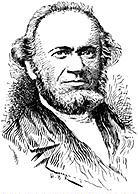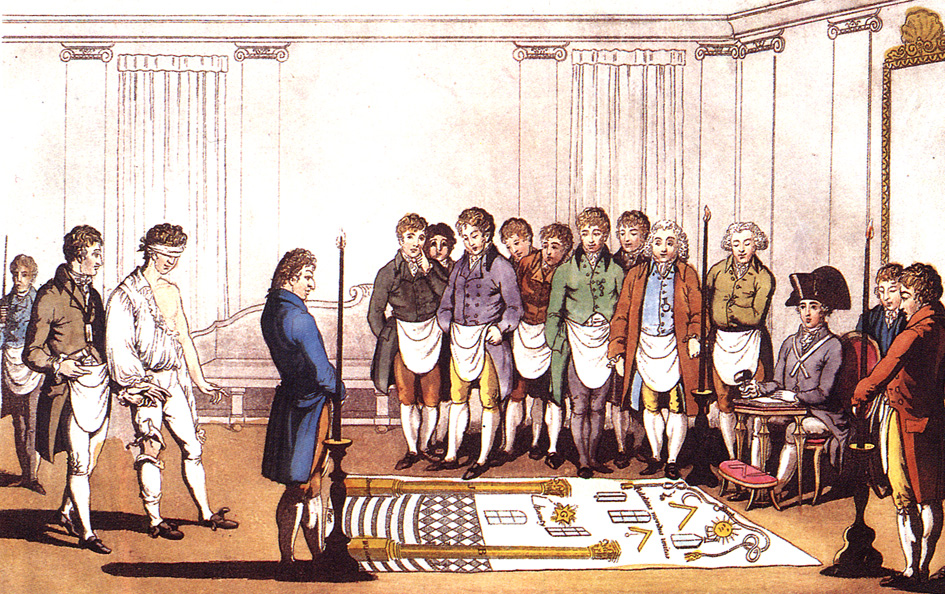|
Abraham Rice
Abraham Joseph Rice (born Abraham Reiss) (c. 18001862) was the first semikhah, ordained rabbi to serve in a rabbinical position in the United States. Rice was born in 1800 or 1802 at Gochsheim, near Schweinfurt, Lower Franconia. An injury in infancy left him with a limp.Levine He studied at the Würzburg ''yeshivah,'' and was ordained by Rabbi Abraham Bing. He later continued his studies at the ''yeshivah'' of Rabbi Wolf Hamburger in Fürth, and then headed a small ''yeshivah'' in the village of Zell am Main, Zell, near Würzburg.Singer In the 1830s he married Rosalie Leucht, and in 1840 they immigrated to the United States. After a brief attempt at reviving the Jewish community in Newport, Rhode Island, he accepted an appointment as the first rabbi of Baltimore Hebrew Congregation, Congregation Nidche Israel in Baltimore. Rice usually delivered his sermons in German language, German, later occasionally in English language, English, and insisted on retaining all the tradition ... [...More Info...] [...Related Items...] OR: [Wikipedia] [Google] [Baidu] |
English Language
English is a West Germanic language that developed in early medieval England and has since become a English as a lingua franca, global lingua franca. The namesake of the language is the Angles (tribe), Angles, one of the Germanic peoples that Anglo-Saxon settlement of Britain, migrated to Britain after its End of Roman rule in Britain, Roman occupiers left. English is the list of languages by total number of speakers, most spoken language in the world, primarily due to the global influences of the former British Empire (succeeded by the Commonwealth of Nations) and the United States. English is the list of languages by number of native speakers, third-most spoken native language, after Mandarin Chinese and Spanish language, Spanish; it is also the most widely learned second language in the world, with more second-language speakers than native speakers. English is either the official language or one of the official languages in list of countries and territories where English ... [...More Info...] [...Related Items...] OR: [Wikipedia] [Google] [Baidu] |
Hebrew School
Hebrew school is Jewish education focusing on topics of Jewish history, learning the Hebrew language, and finally learning one's Torah Portion, in preparation for the ceremony in Judaism of entering adulthood, known as a Bar or Bat Mitzvah. Hebrew school is usually taught in dedicated classrooms at a synagogue, under the instruction of a Hebrew teacher (who may or may not be fluent in Hebrew), and often receives support from the cantor for learning the ancient chanting of a student's Torah portion, and from the rabbi during their ceremony since they must read from a Torah scroll, which has no Hebrew vowels, and very close together text and minimal line spacing; making it very challenging to read from. Hebrew school can be either an educational regimen separate from secular education similar to the Christian Sunday school, education focusing on topics of Jewish history and learning the Hebrew language, or a primary, secondary or college level educational institution where some o ... [...More Info...] [...Related Items...] OR: [Wikipedia] [Google] [Baidu] |
The Occident And American Jewish Advocate
''The Occident and American Jewish Advocate'' or simply ''The Occident'' (1843-1869), was the first general Jewish periodical published in the United States. The only earlier periodical, Solomon Henry Jackson's ''The Jew'', was published as an anti-missionary journal. Compiled by Rabbi Isaac Leeser Isaac Leeser (December 12, 1806 – February 1, 1868) was an American Orthodox Jewish religious leader, teacher, scholar and publisher. He helped found the Jewish press of America, produced the first Jewish translation of the Bible into English, ... from inception through 1868, in 1869 the publication was edited by Mayer Sulzberger. Sulzberger, a successful attorney was a disciple of Leeser's in his youth. Leeser hoped Sulzberger would enter the rabbinate, but Sulzberger chose a career in law instead, but pledged to Leeser that he would edit the Occident for a year, which he fulfilled after Leeser's death. A monthly publication, ''the Occident'' did print weekly between April 1859 ... [...More Info...] [...Related Items...] OR: [Wikipedia] [Google] [Baidu] |
Isaac Leeser
Isaac Leeser (December 12, 1806 – February 1, 1868) was an American Orthodox Jewish religious leader, teacher, scholar and publisher. He helped found the Jewish press of America, produced the first Jewish translation of the Bible into English, and helped organize various social and educational organizations. He is considered one of the most important nineteenth century American Jewish personalities. He was "fiercely opposed" to Reform Judaism and was regarded as one of the most important "orthodox" rabbis of his era. Leeser is regarded as a forerunner by both Modern Orthodox Judaism and Conservative Judaism. Early life Isaac Leeser was born to Sarah Leeser and her husband Leffman Leeser in Neuenkirchen/Rheine, Westphalia, but his parents died when he was young. His grandmother encouraged his religious studies under the guidance of the chief rabbi of Münster. Young Leeser was educated at the primary school in nearby Dülmen and then at a gymnasium in Münster. This gave him a ... [...More Info...] [...Related Items...] OR: [Wikipedia] [Google] [Baidu] |
Halacha
''Halakha'' ( ; , ), also transliterated as ''halacha'', ''halakhah'', and ''halocho'' ( ), is the collective body of Jewish religious laws that are derived from the Written and Oral Torah. ''Halakha'' is based on biblical commandments ('' mitzvot''), subsequent Talmudic and rabbinic laws, and the customs and traditions which were compiled in the many books such as the '' Shulchan Aruch'' or '' Mishneh Torah''. ''Halakha'' is often translated as "Jewish law", although a more literal translation might be "the way to behave" or "the way of walking". The word is derived from the root, which means "to behave" (also "to go" or "to walk"). ''Halakha'' not only guides religious practices and beliefs; it also guides numerous aspects of day-to-day life. Historically, widespread observance of the laws of the Torah is first in evidence beginning in the second century BCE, and some say that the first evidence was even earlier. In the Jewish diaspora, ''halakha'' served many Jewish comm ... [...More Info...] [...Related Items...] OR: [Wikipedia] [Google] [Baidu] |
Talmud
The Talmud (; ) is the central text of Rabbinic Judaism and the primary source of Jewish religious law (''halakha'') and Jewish theology. Until the advent of Haskalah#Effects, modernity, in nearly all Jewish communities, the Talmud was the centerpiece of Jewish culture, Jewish cultural life and was foundational to "all Jewish thought and aspirations", serving also as "the guide for the daily life" of Jews. The Talmud includes the teachings and opinions of thousands of rabbis on a variety of subjects, including halakha, Jewish ethics, Jewish philosophy, philosophy, Jewish customs, customs, Jewish history, history, and Jewish folklore, folklore, and many other topics. The Talmud is a commentary on the Mishnah. This text is made up of 63 Masekhet, tractates, each covering one subject area. The language of the Talmud is Jewish Babylonian Aramaic. Talmudic tradition emerged and was compiled between the destruction of the Second Temple in 70 CE and the Arab conquest in the early seve ... [...More Info...] [...Related Items...] OR: [Wikipedia] [Google] [Baidu] |
Reform Judaism
Reform Judaism, also known as Liberal Judaism or Progressive Judaism, is a major Jewish religious movements, Jewish denomination that emphasizes the evolving nature of Judaism, the superiority of its Jewish ethics, ethical aspects to its ceremonial ones, and belief in a continuous revelation which is closely intertwined with human reason and not limited to the Theophany at Mount Sinai (Bible), Mount Sinai. A highly Religious liberalism, liberal strand of Judaism, it is characterized by little stress on ritual and personal observance, regarding Jewish law as non-binding and the individual Jew as autonomous, and by a great openness to external influences and Progressivism, progressive values. The origins of Reform Judaism lie in German Confederation, mid-19th-century Germany, where Rabbi Abraham Geiger and his associates formulated its early principles, attempting to harmonize Jewish tradition with modern sensibilities in the age of Jewish emancipation, emancipation. Brought to Am ... [...More Info...] [...Related Items...] OR: [Wikipedia] [Google] [Baidu] |
Har Sinai Congregation
Har or HAR may refer to: People * Har Bilas Sarda (1867-1955), Indian academic, judge and politician * Har Sharma (1922–1992), Indian cricket umpire Mythology * Hár and Hárr, among the many names of Odin in Norse mythology * Horus, an Egyptian god * Shiva, a Hindu god Other uses * Capital City Airport (Pennsylvania), IATA code * Har (Blake), a character in the mythological writings of William Blake * Hár (crater), a crater on Jupiter's moon Callisto * Har (Korean surname) * HAR (file format), the HTTP Archive format * Harari language, spoken in Ethiopia, ISO 639-3 code * Harrisburg Transportation Center, Amtrak station code * Highway advisory radio * Human accelerated regions, the name of some human genes * MC-Hár, a Faroese rap rock group * Har, a component of Hebrew placenames literally meaning "mountain" * Haryana Haryana () is a States and union territories of India, state located in the northern part of India. It was carved out after the linguistic ... [...More Info...] [...Related Items...] OR: [Wikipedia] [Google] [Baidu] |
Masonic Ritual And Symbolism
Masonic ritual is the scripted words and actions that are spoken or performed during the degree work in a Masonic lodge. Masonic symbolism is that which is used to illustrate the principles which Freemasonry espouses. Masonic ritual has appeared in a number of contexts within literature (for example: " The Man Who Would Be King", by Rudyard Kipling, and '' War and Peace'', by Leo Tolstoy). Purpose Freemasonry is described in its own ritual as a "Beautiful and profound system of morality, veiled in allegories and illustrated by symbols". The symbolism of Freemasonry is found throughout the Masonic lodge, and contains many of the working tools of a medieval or renaissance stonemason. The whole system is transmitted to initiates through the medium of Masonic ritual, which consists of lectures and allegorical plays. Common to all of Freemasonry is the three grade system of ''Craft'' or '' Blue Lodge'' freemasonry, whose allegory is centred on the building of the Temple of Solomon, a ... [...More Info...] [...Related Items...] OR: [Wikipedia] [Google] [Baidu] |
Torah Reading
Torah reading (; ') is a Jewish religious tradition that involves the public reading of a set of passages from a Torah scroll. The term often refers to the entire ceremony of removing the scroll (or scrolls) from the Torah ark, chanting the appropriate excerpt with special cantillation (trope), and returning the scroll(s) to the ark. It is also commonly called "laining" (''lein'' is also spelt ''lain'', ''leyn'', ''layn''; from the Yiddish לייענען (), which means "to read"). Regular public reading of the Torah was introduced by Ezra the Scribe after the return of the Judean exiles from the Babylonian captivity ( BCE), as described in the Book of Nehemiah. In the modern era, Orthodox Jews practice Torah reading according to a set procedure almost unchanged since the Talmudic era. Since the 19th century CE, Reform and Conservative Judaism have made adaptations to the practice of Torah reading, but the basic pattern of Torah reading has usually remained the same: As a pa ... [...More Info...] [...Related Items...] OR: [Wikipedia] [Google] [Baidu] |





